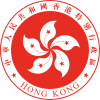| This article may require copy editing for grammar, style, cohesion, tone, or spelling. You can assist by editing it. (May 2024) (Learn how and when to remove this message) |

Hong Kong nationalism (Chinese: 香港民族主義 or 香港主義) is a system of thought that spans the folklore, culture, history, geography, society, and politics of Hong Kong. Hong Kong nationalism is generally considered a new phenomenon. The self-identification of the Hong Kong people had only been considered nationalism when the local discourse developed claims of self-determination, autonomy and varying degrees of separation from China.
Hong Kong nationalism is a strong desire to protect democracy in Hong Kong, it is values opposition to mainlandization and local Hong Kong identity. Many Hong Kong nationalists are opposed to Chinese state nationalism (中國國家主義).
History
See also: Anti-communism in China § Hong Kong, and Localism in Hong KongTens of thousands moved to Hong Kong in 1949 to escape the Chinese Communist Revolution. The population of Hong Kong increased from 1.8 million in 1947 to 2.2 million in 1951. As mainland Chinese fled to Hong Kong over the next 30 years, the population of Hong Kong increased by 1 million every 10 years. Those who experienced hunger and political struggle under the Chinese Communist Party (CCP) internalized stronger anti-communist sentiments than Hong Kongers who did not experience CCP rule.
Distinct Hong Kong identity existed from the 1970s, but Hong Kong nationalist sentiment did not appear significantly until the Tiananmen massacre of 1989. The Tiananmen massacre and the pro-democracy movement in colonial Hong Kong strengthened feelings of division between Hong Kong and mainland China.
Since the 2010s, the Hong Kong nationalist movement has emerged as the "localist camp".
View of the United Kingdom

In the mid-20th century, anti-colonial Hong Kong nationalism was critical of British imperialism. It distinguished itself from Chinese nationalism and advocated regional characteristics such as Cantonese. Today however, some Hong Kong nationalists romanticize British Hong Kong as a consequence of their antipathy towards the mainland Chinese government.
Pro-Taiwanese sentiment
See also: Pro-Taiwanese sentimentThe Hong Kong–Mainland China conflict and the Umbrella Revolution reminded many Hong Kongers of the February 28 incident and the Sunflower Movement in Taiwan. Some young Hong Kongers have begun to support Hong Kong independence, showing a more favorable attitude towards Taiwanese independence.
Hong Kong independence
Main article: Hong Kong independenceThe Hong Kong independence movement is part of Hong Kong nationalism. Hong Kong independence activists reject "one country, two systems" (一國兩制) and support "two countries, two systems" (兩國兩制). The Hong Kong independence movement belongs to the 'radicals' even within the localist camp.
Criticism
See also: Anti-Chinese sentiment and Racism in China § In Hong KongSome media outlets have criticized the anti-mainland China sentiment that exists inside Hong Kong's pro-democracy movement. The more Hong Kong democracy activists employ anti-mainland rhetoric, rather than anti-oppression or anti-autocracy rhetoric, the more they provoke Chinese nationalists among the mainland population. This enables Chinese Communist Party leadership to reap political gains from a hardline stance.
Organizations
See also: Category:Localist parties in Hong Kong and ALLinHK- Alliance of Resuming British Sovereignty over Hong Kong and Independence
- Civic Passion
- Democratic Progressive Party of Hong Kong
- Hong Kong Independence Party
- Hong Kong Indigenous
- Hong Kong National Front
- Hong Kong National Party
- Studentlocalism
- Tsz Wan Shan Constructive Power
- Youngspiration
See also
- Cantonese nationalism
- Chinese imperialism, opposed by Hong Kong nationalists.
- "Glory to Hong Kong"
- Hong Kong Autonomy Movement, they emphasize Hong Kong identity but do not support independence.
- Hong Konger Front
- Local ethnic nationalism
- Shanghai National Party, an anti-communist "Shanghai nationalist" (上海民族主义) party claiming independence in Shanghai.
- Stateless nation
- Taiwanese nationalism
References
- ^ Kevin Carrico (April 8, 2022). Two Systems, Two Countries: A Nationalist Guide to Hong Kong. University of California Press.
- ^ Justin Chun-ting Ho (15 November 2023). "Hong Kong Anti-colonial Nationalism during the Chinese Language Campaign". Cambridge University Press. 258: 384–399. doi:10.1017/S0305741023001534.
- "'Good' vs 'Bad' Nationalism in Asia: The task of keeping nationalism civic, rather than aggressive and authoritarian". The Diplomat. September 23, 2019.
- ^ Daniel Cetrà; Coree Brown Swan (2022). State and Majority Nationalism in Plurinational States. Taylor & Francis. p. 135. ISBN 978-1-000-81250-3.
On 1 July 2019, a group of protesters stormed the legislative council, graffitied it with political slogans and calls for reform, and placed a British Hong Kong colonial flag on the central podium-the ultimate statement of Hong Kong nationalism, or at least opposition to Chinese state nationalism.
- "中門大開:厭共情緒". Next Media Limited. 2015-07-30. Archived from the original on 2017-08-06.
- Andrew J. Nathan; Brian C. H. Fong; Jieh-min Wu (December 30, 2020). China's Influence and the Center-periphery Tug of War in Hong Kong, Taiwan and Indo-Pacific. Taylor & Francis. ISBN 978-1-000-28426-3.
- "港大民研發放最新香港民眾身分認同調查結果". Public Opinion Programme, The University of Hong Kong. Archived from the original on 27 July 2014. (10-13/6/2013)
- "孔诰峰:香港年轻人「本土认同」超过「大中华认同」". Radio Free Asia. 2013-06-11. Archived from the original on 2015-03-24.
- "The Anti-Mainland Bigotry of Hong Kong's Democracy Movement". Foreign Policy. 2016-11-29.
| Ethnic nationalism | |||||||||||||||||||||||||||||||||||||||||||||||||||||||||||||||||
|---|---|---|---|---|---|---|---|---|---|---|---|---|---|---|---|---|---|---|---|---|---|---|---|---|---|---|---|---|---|---|---|---|---|---|---|---|---|---|---|---|---|---|---|---|---|---|---|---|---|---|---|---|---|---|---|---|---|---|---|---|---|---|---|---|---|
| Nationalisms in |
| ||||||||||||||||||||||||||||||||||||||||||||||||||||||||||||||||
| Pan-nationalism | |||||||||||||||||||||||||||||||||||||||||||||||||||||||||||||||||
| Movements |
| ||||||||||||||||||||||||||||||||||||||||||||||||||||||||||||||||
| Projects |
| ||||||||||||||||||||||||||||||||||||||||||||||||||||||||||||||||
| Other | |||||||||||||||||||||||||||||||||||||||||||||||||||||||||||||||||
| |||||||||||||||||||||||||||||||||||||||||||||||||||||||||||||||||
| Part of democratic development in Hong Kong and the Hong Kong–Mainland China conflict | |||||||||||||||
| Causes | |||||||||||||||
| History |
| ||||||||||||||
| Police misconduct | |||||||||||||||
| Tactics and methods |
| ||||||||||||||
| Reactions | |||||||||||||||
| Related articles |
| ||||||||||||||
